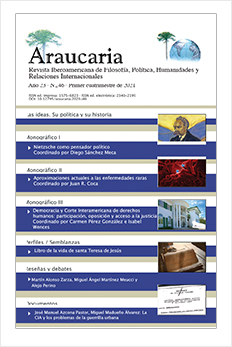Nietzsche: for a politics of the individual
DOI:
https://doi.org/10.12795/araucaria.2021.i46.13Keywords:
Nietzsche, Politics, Individual, Democracy, TocquevilleAbstract
Although Nietzsche never formulated an actual political theory, his critique of modernity and his search for alternative solutions to raise the 'human type' are certainly part of a “große Politik” project, which, however, belongs more to the realm of philosophy and culture than to that of a science of government. In opposition to homologating organisations - political, economic, moral - that have robbed man of his most peculiar energies, Nietzsche works for the promotion of a strong individuality that alone can promise lasting constructions. Originality and the ability to incorporate discordant elements are, for Nietzsche, symptoms of a superior culture: the 'good European' of the future will therefore be the one who, beyond narrow personal and national boundaries, will be able to open up to fruitful hybridisation.
Nietzsche - Politics - Individual - Democracy - Tocqueville
Downloads
References
Acampora, Christa Davis, “Demos Agonistes Redux: Reflections on the Streit of Political Agonism”, en Nietzsche-Studien, 32 (2003), pp. 373-89.
Ansell-Pearson, Keith, An Introduction to Nietzsche as political Thinker. The perfect nihilist, Cambridge, Cambridge University Press 1994.
Bobbio, Noberto, “Stato, potere e governo”, en: Stato, governo, società. Frammenti di un dizionario politico, Turín, Einaudi 1985.
Campioni, Giuliano, Sulla strada di Nietzsche, Pisa, ETS 1993.
Campioni, Giuliano, Der französische Nietzsche, Berlin/New York, Walter de Gruyter, 2009.
Conway, Daniel W., Nietzsche & the Political, London, Routledge 1997.
Esposito, Roberto, Bíos. Biopolitica e filosofia, Turín, Einaudi, 2004.
Fornari, Maria Cristina, La morale evolutiva del gregge. Nietzsche legge Spencer e Mill, Pisa, ETS 2006.
Franco, Vittoria, “L’individuo sovrano e la sua impossibilità. Friedrich Nietzsche”. In: Etiche possibili: il paradosso della morale dopo la morte di Dio, Roma, Donzelli, pp. 45-78.
Gentili, Carlo, Grande politica e pathos della distanza. La concezione politica e morale di Nietzsche, “Palomar”, Vol. 2/3 (2005), pp. 96-106.
Gentili, Carlo, Nietzsche politico o apolitico? «Estudios Nietzsche» 12 (2012), pp. 10-11.
Gori, Pietro; Stellino, Paolo, Il buon europeo di Nietzsche oltre nichilismo e morale cristiana, “Giornale critico della filosofia italiana”, 7 serie, vol. XII, a. 95 (1), 2016, pp. 98-124.
Lemm, Vanessa “Nietzsche y la biopolítica: cuatro lecturas de Nietzsche como pensador biopolítico”, en Ideas y Valores, 64 (158), 2015, pp. 223-248.
Losurdo, Domenico, Nietzsche, il ribelle aristocratico. Torino, Bollati Boringhieri 2002.
Mill, John Stuart, Gesammelte Werke, Leipzig, Fues, 1869-1880.
Ottmann, Henning, Philosophie und Politik bei Nietzsche, Berlin, de Gruyter 1987.
Siemens, Herman, Nietzsche and Agonistic Politics: A Review of Recent Literature, “Nietzsche-Studien”, 30 (2001), pp. 509-526: 510-11.
Downloads
Published
How to Cite
Issue
Section
License
Las ediciones impresa y electrónica de esta Revista son editadas por el Secretariado de Publicaciones de la Universidad de Sevilla, siendo necesario citar la procedencia en cualquier reproducción parcial o total.Salvo indicación contraria, todos los contenidos de la edición electrónica se distribuyen bajo una licencia de uso y distribución “Creative Commons Atribución-NoComercial-SinDerivar 4.0 Internacional”








